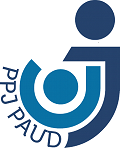THE CORRELATION BETWEEN DEMOCRATIC PARENTING AND 4-5 YEAR-OLD CHILDREN’S AUTONOMY IN GONILAN VILLAGE
Abstract
Planting character values needs to be given from an early age. One of the character values that needs to be instilled early is independence.The role and parent's support is needed to build an independent child character. Parenting is one of the factors that influence children's independence. The purpose of this study was to find out whether there was a relationship between democratic parenting and disciplines of children aged 4-5 years in Gonilan Village. This study uses quantitative approaches with correlation research type. This research was conducted on January 2019 by using a sample of 69 children and parents of children aged 4-5 years in Gonilan Village. Retrieving data from this study uses questionnaires that distributed to the parents. The results of the hypothesis test of the Spearman Rho correlation indicate that the significance value is 0,000 <0.05 which means the hypothesis is accepted, there is a relationship between democratic parenting with the independence of children aged 4-5 years in Gonilan Village. The results of the correlation coefficient are 0.998 using the Spearman Rho hypothesis test, which means the higher the democratic parenting style of parents, the higher the child's independence.
Keywords
Full Text:
PDFReferences
A. M. A. L. I. N. A. SURYA PUTRI, “HUBUNGAN POLA ASUH ORANG TUA TERHADAP KEMANDIRIAN ANAK TK KELOMPOK B DI TK DHARMA WANITA PERSATUAN I DAN TK ISLAM NURUL MUTTAQIN PESISIR KEC. CAMPLONG. PAUD Teratai,” J. UNESA, vol. 2, no. 1, 2013. [2] Komala, “Mengenal dan Mengembangkan Kemandirian Anak Usia Dini Melalui Pola Asuh Orang Tua dan Guru.,” Tunas Siliwangi, vol. 1, no. 1, pp. 31–45, 2015. [3] J. S. Yamin, M & Sanan, Panduan Pendidikan Anak Usia Dini. Jakarta: Gaung Persada (GP) Press, 2013. [4] M. Dowling, Young Children’s personal, social, and emotional development 3rd edition. London: Sage, 2010. [5] M. Ward, “An historical perspective of self-determination in special education,” Accompl. challlenges Res. Pract. Pers. with Sev. Disabil., vol. 2, no. 2, pp. 229–239, 2005. [6] D. Bee, H., & Byond, The developing child. Ten Edition. London: Pearson Education, 2004. [7] G. Holden, “Childrearing and developmental trajectories: Positive pathways, off-ramps, and dynamic processes,” Child Dev. Perspect., vol. 4, no. 3, pp. 197–204, 2010. [8] K. G. Rice, F. P., & Dolgin, The Adolescent: Development, Relationship, and Culture 12th ed. USA: Pearson Education, 2008. [9] E. B. Hurlock, Psikologi Perkembangan: Suatu Pendekatan Sepanjang Rentang Kehidupan Edisi Kelima. Jakarta: Erlangga, 1999. [10] M. D. Berzonsky, Adolescent Development. New York: Macmillan Publishing Co., 1981. [11] C. T. Ruswaraditra, Pola Asuh Pembina Terhadap Santri di Pondok Pesantren Darul Arqom Muhammadiyah Garut. Universitas Islam Negeri Syarif Hidayatullah., 2008. [12] A. S. Putri, “Hubungan Pola Asuh Orang Tua Terhadap Kemandirian Anak TK Kelompok B di TK Dharma Wanita Persatuan I dan TK Islam Nurul Muttaqin Pesisir Kec Camplong.,” 2012. [13] G. D. Sunarty, K., & Dirawan, “Development Parenting Model to Increase the Independence of Children.,” Int. Educ. Stud., vol. 8, no. 10, pp. 107-113., 2015.
DOI: https://doi.org/10.20961/ecedj.v2i2.48322
Refbacks
- There are currently no refbacks.
Copyright (c) 2020 Early Childhood Education and Development Journal

This work is licensed under a Creative Commons Attribution-NonCommercial-ShareAlike 4.0 International License.
Early Chilhood Education and Development Journal published by
Departement of Teacher Training of Early Childhood Education
Jalan Slamet Riyadi 449 Surakarta
Email: ecedjournal@gmail.com
Telp : (0271) 719 573

This work is licensed under a Creative Commons Attribution 4.0 International License


